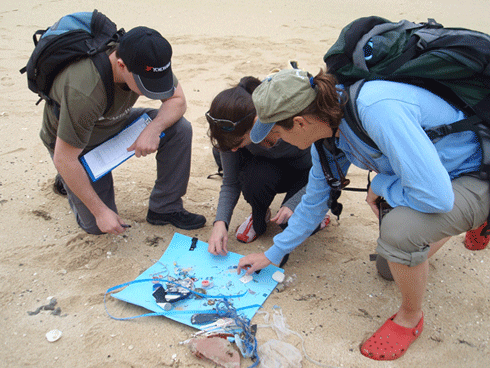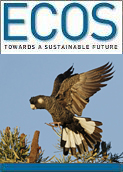
|
Published: 12 June 2013
National survey finds no refuge from coastal rubbish
CSIRO scientists have begun the painstaking task of data analysis after spending 18 months surveying debris along Australia's coastline.

|
|
Scientists investigating beach debris. Credit: CSIRO
|
The results of the National Marine Debris Survey, the first on this scale in the world, will provide information to help guide Australia's waste management and better protect marine life. Early findings include:
-
There are 5.2 pieces of marine debris for every person in Australia
-
74 per cent of the marine debris found is plastic
-
Most of the debris is found near major population centres, but a lot of it is far from our cities, likely driven by ocean currents. This is not typical for most countries with coastlines.
CSIRO scientists led the survey as part of TeachWild, a marine debris research and education program developed by Earthwatch Australia in partnership with CSIRO and founding partner Shell.
Researchers began collecting data 18 months ago north of Cairns, at 100-kilometre intervals around Australia's 35 000-kilometre coastline. Their work was supplemented by data collected by nearly 3000 school children from around the country – from Broome in Western Australia, to Strahan in Tasmania and Torquay in Victoria.
Coastal survey results will be matched with ocean currents to see not only where Australia's debris comes from, but where it goes. These ‘debris maps’ will be overlaid with wildlife distribution patterns to locate the types of rubbish most dangerous to seabirds, whales, dolphins and turtles.
Project leader, CSIRO's Dr Denise Hardesty, recently presented preliminary survey findings at the Melbourne Aquarium during an event to celebrate World Oceans Day. She pointed out that rubbish discarded in cities could be dispersed hundreds to thousands of kilometres by ocean currents.
‘These findings highlight the importance of having a national understanding of the sources of marine debris, and the factors influencing its distribution, in order to tackle the problem effectively,’ Dr Hardesty said.
Professor David McInnes, the Chief Executive of EarthWatch, said the survey was a great example of citizen science.
‘Involving students in this research and education program has been received positively by students and teachers. Students have been telling us how much they have enjoyed learning about marine wildlife and how humans are impacting their livelihood.’
Source: CSIRO & Teachwild



